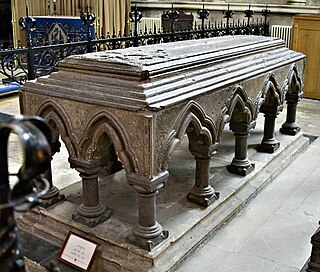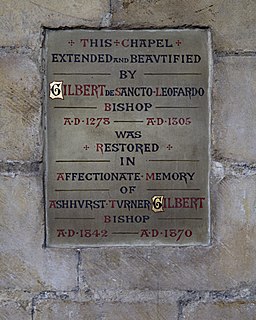Related Research Articles
Henry Wingham was a Lord Chancellor of England and Bishop of London.
John Chishull or John de Chishull was Lord Chancellor of England, Bishop of London, and Lord High Treasurer during the 13th century. He also served as Dean of St Paul's.

Sewal de Bovil was a medieval Archbishop of York.
Richard FitzNeal was a churchman and bureaucrat in the service of Henry II of England.
John Blund was an English scholastic philosopher, known for his work on the nature of the soul, the Tractatus de anima, one of the first works of western philosophy to make use of the recently translated De Anima by Aristotle and especially the Persian philosopher Avicenna's work on the soul, also called De Anima. He taught at Oxford University along with Edmund of Abingdon. David Knowles said that he was "noteworthy for his knowledge of Avicenna and his rejection of the hylomorphism of Avicebron and the plurality of forms.", although the problem of the plurality of forms as understood by later scholastics was not formulated explicitly in Blund's time. Maurice Powicke calls him the "first English Aristotelian."
William of St. Barbara or William of Ste Barbe was a medieval Bishop of Durham.
William Langton was a medieval English priest and nephew of Archbishop Walter de Gray. William was selected but never consecrated as Archbishop of York and Bishop of Carlisle.
Roger of Salisbury was a Bishop of Bath and Wells.
William of Bitton was a medieval English Bishop of Bath and Wells.
William of Bitton was a medieval Bishop of Bath and Wells.
John of Greenford was a medieval Bishop of Chichester.
Seffrid II was an English cleric who served as a medieval Bishop of Chichester.
Ranulf of Wareham was a medieval Bishop of Chichester.
John Climping was a medieval Bishop of Chichester.
Stephen Bersted was a medieval Bishop of Chichester.

Gilbert de St Leonard was a medieval Bishop of Chichester.
Ralph Walpole was a medieval Bishop of Norwich and Bishop of Ely.
Henry of Lexington was a medieval Bishop of Lincoln.
Richard of Gravesend was a medieval Bishop of Lincoln.
Oliver Sutton was a medieval Bishop of Lincoln, in England.
References
- Fryde, E. B.; Greenway, D. E.; Porter, S.; Roy, I. (1996). Handbook of British Chronology (Third revised ed.). Cambridge, UK: Cambridge University Press. ISBN 0-521-56350-X.
- Greenway, Diana E. (1996). "Bishops". Fasti Ecclesiae Anglicanae 1066-1300. Vol. 5: Chichester. Institute of Historical Research. Archived from the original on 8 February 2012. Retrieved 20 October 2007.
- Greenway, Diana E. (1996). "Deans". Fasti Ecclesiae Anglicanae 1066-1300. Vol. 5: Chichester. Institute of Historical Research. Retrieved 20 October 2007.
- Richardson, H. G.; Sayles, G. O. (1963). The Governance of Mediaeval England: From the Conquest to Magna Carta. Edinburgh: Edinburgh University Press. OCLC 504298.